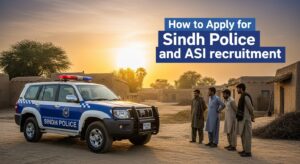Applying for a police constable position in Pakistan involves a sequence of steps that demand attention to detail, careful timing, and a proactive mindset. To begin with, you must understand whether you are eligible for the role, which includes reviewing your educational qualifications, physical standards, age bracket, and domicile requirements.
These standards are not uniform across all provinces. For instance, while some regions accept matriculation as the minimum educational qualification, others may expect intermediate. Similarly, height and chest measurements differ slightly between provinces and between male and female applicants. Once you are sure you meet the criteria, the next important task is staying alert for official recruitment announcements.
These are usually posted on provincial police websites, shared through newspapers, or sometimes updated on government portals and public service commission platforms. Missing a deadline or misunderstanding a region-specific instruction can cost you the opportunity, so consistent monitoring is essential.
Once the recruitment notice is out, you need to move quickly and prepare the necessary documents. These include your CNIC, educational certificates, domicile, recent photographs, and any other documents that may be specified. In some cases, a character certificate or a physical fitness report may also be required. These documents should be up to date and properly attested. The application process itself varies slightly depending on the province.
For most regions, you will either download a form or submit it directly through the police department’s website. Some regions, like Gilgit Baltistan, process applications through the HEC ETC online portal, where you also upload proof of fee payment along with your documents. This step requires accuracy. A small error in your form or forgetting to upload a required file can lead to disqualification. After submission, keep a printed copy and note down any reference numbers or tracking details for future use.
Once your application is accepted, the real challenge begins with physical and written assessments. Physical fitness is tested through running, endurance drills, and body measurements, and the expectations are different for male and female candidates. It is not enough to assume you’ll manage on test day. You need to train for it weeks in advance, especially for the 1.6 km timed run and strength-related evaluations. If you pass the physical stage, you’ll move on to a written examination that covers basic English, Urdu, mathematics, and general knowledge, including current affairs and province-specific questions.
After the written test, shortlisted candidates are called for interviews, where you are expected to present yourself confidently and show an understanding of the duties and challenges of being a police constable. Once selected, you go through a medical check-up and, if cleared, receive a formal appointment.
This leads to the final phase: police training, where you will be officially inducted and posted upon successful completion. Each of these steps requires mental preparation, physical readiness, and a thorough understanding of procedural expectations.
Step 1: Understand the Role and Eligibility Criteria in Depth
What Does a Police Constable Do?
A Police Constable is the frontline law enforcement official responsible for maintaining public order, preventing crime, assisting in investigations, and serving the community. Constables act as the backbone of the police force, often being the first responders to incidents.
Detailed Eligibility Criteria (Province-wise)
Nationality: Must be a Pakistani citizen with a valid Computerized National Identity Card (CNIC).
Age Limit: Typically 18 to 28 or 30 years depending on province and recruitment cycle. Some provinces provide age relaxation for government employees, ex-servicemen, or certain quota categories.
Education:
- Minimum qualification is usually Matriculation (10th grade) for most provinces.
- Punjab Police often requires Intermediate (12th grade) with minimum marks (e.g., 60% for general category).
- Sindh Police requires minimum Matriculation.
- Gilgit Baltistan and AJK may accept Matric or Intermediate depending on the notification.
Physical Standards:
These vary by province and gender and are strictly enforced.
Province | Male Height | Male Chest (with expansion) | Female Height |
Punjab | 5’7″ | 33″ – 34″ | 5’3″ |
Sindh | 5’5″ | 33″ with 1.5″ expansion | 5’2″ |
KP | 5’6″ | 32″ – 33″ | 5’2″ |
Balochistan | 5’5″ | 31″ – 32.5″ | 5’0″ |
AJK | 5’6″ | 32″ – 33″ | 5’2″ |
Gilgit Baltistan | 5’6″ | 32″ – 33″ | 5’2″ |
Physical Fitness:
Candidates must pass a timed run and other physical tests:
- Males: 1.6 km run in 7–8 minutes.
- Females: 800 meters to 1 km walk/run in 12–14 minutes.
Domicile:
Applicants must have domicile in the province or region where they apply, as per government rules.
Other Requirements:
- No criminal record.
- Good moral character.
- Some provinces require a medical fitness certificate.
Step 2: Monitor Recruitment Announcements and Notifications
Recruitment for Police Constables is announced periodically. To avoid missing deadlines:
Source | Details |
Punjab Police | |
Sindh Police | |
KP Police | |
Balochistan Police | |
AJK Police | |
Gilgit Baltistan Police | |
Newspapers | Daily Dawn, Jang, Express often publish recruitment ads. |
Government Job Portals | Federal Public Service Commission (FPSC), Provincial Public Service Commissions. |
Social Media | Follow official police social media accounts for real-time updates. |
Tip: Create a schedule to check these sources weekly once recruitment season begins.
Step 3: Prepare Required Documents with Precision
Before applying, collect and verify all required documents:
Document | Details |
Computerized National Identity Card (CNIC) | Must be valid and original. |
Domicile Certificate | Issued by the relevant district or provincial authority. |
Educational Certificates | Matric or Intermediate certificates, attested by the relevant board. |
Recent Passport-size Photographs | Usually 4 to 6 photos, with white background, as per specifications. |
Character Certificate | Sometimes required, issued by a local authority or educational institution. |
Medical Fitness Certificate | If specified. |
Other Certificates | Ex-servicemen certificate, disability certificate, or quota certificates if applicable. |
Ensure:
- All documents are attested by gazetted officers.
- Originals are ready for verification at later stages.
- Scanned copies are clear and legible for online upload.
Step 4: Application Submission – Step-by-Step for Each Province
Police Department | Application Instructions |
Punjab Police |
|
Sindh Police |
|
Khyber Pakhtunkhwa (KP) Police |
|
Balochistan Police |
|
Azad Jammu & Kashmir (AJK) Police |
|
Gilgit Baltistan Police |
|
Step 5: Prepare for the Physical Test with Discipline
Physical tests are crucial and non-negotiable. To prepare:
- Start training early: At least 6–8 weeks before the test.
- Cardiovascular fitness: Practice running 1.6 km (males) or 800 m (females) within required time.
- Strength training: Push-ups, sit-ups, and other exercises to build endurance.
- Diet and rest: Maintain a balanced diet rich in proteins and carbohydrates; get adequate sleep.
- Mock tests: Simulate test conditions to build confidence.
On test day:
- Wear appropriate sports attire.
- Arrive early at the test center.
- Warm up properly to avoid injuries.
- Follow instructions carefully.
Step 6: Written Examination Preparation
The written test evaluates your knowledge and aptitude.
Subjects Covered
- General Knowledge: Pakistan’s history, geography, current affairs.
- Pakistan Studies: Constitution, national heroes, important events.
- Everyday Science: Basic scientific principles.
- Islamic Studies: Basic knowledge of Islam.
- English and Urdu: Grammar, comprehension, essay writing, translation.
- Intelligence Test: Logical reasoning, pattern recognition.
- Computer Science: Basic computer knowledge (in some provinces).
Preparation Tips
- Use past papers and sample tests available online.
- Read newspapers daily to stay updated on current affairs.
- Practice essay writing and translations.
- Join coaching centers or study groups if possible.
- Allocate daily study time and stick to a schedule.
Step 7: Attend the Interview and Psychological Evaluation
After passing the physical and written tests, candidates are called for an interview.
Interview Preparation:
- Be punctual and dress neatly.
- Review your application form and personal details.
- Be ready to answer questions about your motivation, knowledge of police duties, and general awareness.
- Practice common interview questions.
Psychological Evaluation:
- Some provinces conduct psychological tests to assess mental fitness.
- Stay calm and answer honestly.
Step 8: Final Selection, Medical Examination, and Training
- Final Merit List: Based on combined scores from all tests and interview.
- Medical Examination: Comprehensive health check-up to confirm fitness.
- Training: Selected candidates undergo police academy training covering law, firearms, physical fitness, and ethics.
- Posting: After training, constables are assigned to police stations or units.
Common Issues and How to Troubleshoot Them Effectively
Issue # | Issue | Solution |
1 | Difficulty Finding Official Recruitment Announcements Fake or outdated ads on social media cause confusion. | Always verify announcements on official police or government websites. Bookmark official portals and subscribe to their newsletters or social media for updates. |
2 | Problems with Online Registration and Application Submission Website crashes, slow loading, or payment gateway failures. |
|
3 | Document Upload Errors File size or format not accepted; blurry or unclear scans. |
|
4 | Missing Deadlines Candidates miss application or test dates. |
|
5 | Physical Test Failures Candidates fail to meet physical standards. |
|
6 | Written Test Challenges Lack of preparation or unfamiliarity with test format. |
|
7 | Interview Anxiety or Poor Performance Nervousness leads to poor communication. |
|
8 | Medical Examination Failures Health issues detected during medical check-up. |
|
9 | Verification and Documentation Issues Discrepancies in documents or unverifiable certificates. |
|
Final Recommendations
- Start early and plan your entire application and preparation process.
- Keep multiple copies of all documents and application confirmations.
- Stay updated with official notifications and changes.
- Maintain physical and mental fitness throughout.
- Approach the process with honesty and patience.









